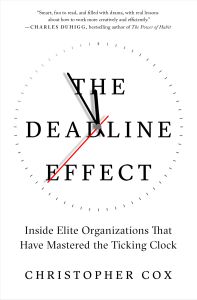Acesse a sua conta getAbstract para obter o resumo!

Acesse a sua conta getAbstract para obter o resumo!
Christopher Cox
The Deadline Effect
How to Work Like It’s the Last Minute – Before the Last Minute
Avid Reader Press, 2021
Sobre o que é?
Fast-approaching deadlines can spark feelings of panic, but you can leverage deadlines to your advantage.
Recommendation
Procrastination is a common human foible. When facing a big project with a looming deadline, many people tend to postpone their work until the last possible minute. Veteran journalist Christopher Cox, no stranger to deadlines, went behind the scenes at nine organizations, across diverse industries, to learn the strategies they employ to reach their goals on time. His fresh, eloquent analysis – teeming with colorful, expository case studies – illustrates how you, too, can learn to leverage deadlines to your advantage.
Summary
About the Author
Veteran journalist Christopher Cox has written for The New York Times Magazine, GQ, Harper’s Magazine, Wired and Slate. He is a former chief editor of Harper’s and executive editor of GQ.



















Comment on this summary